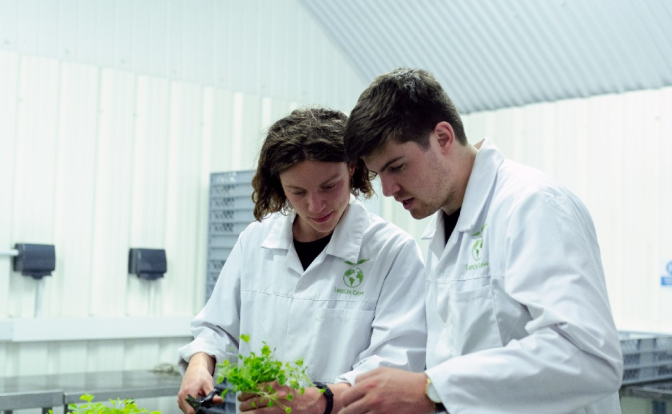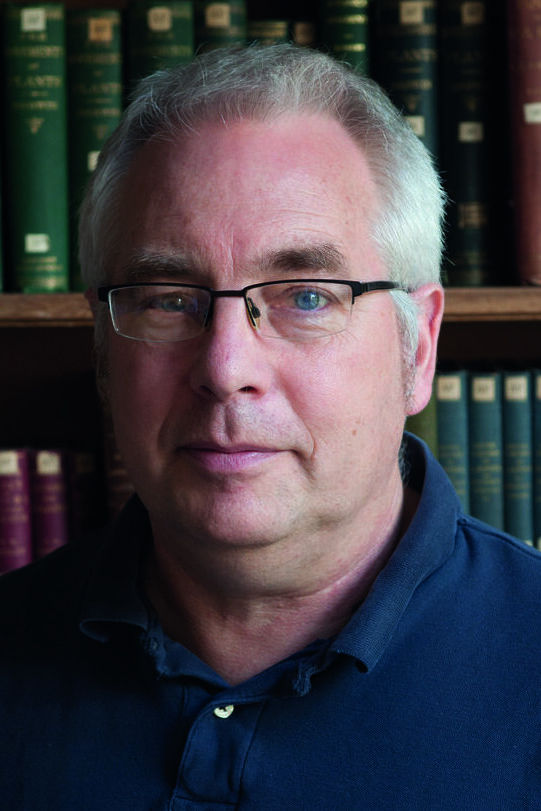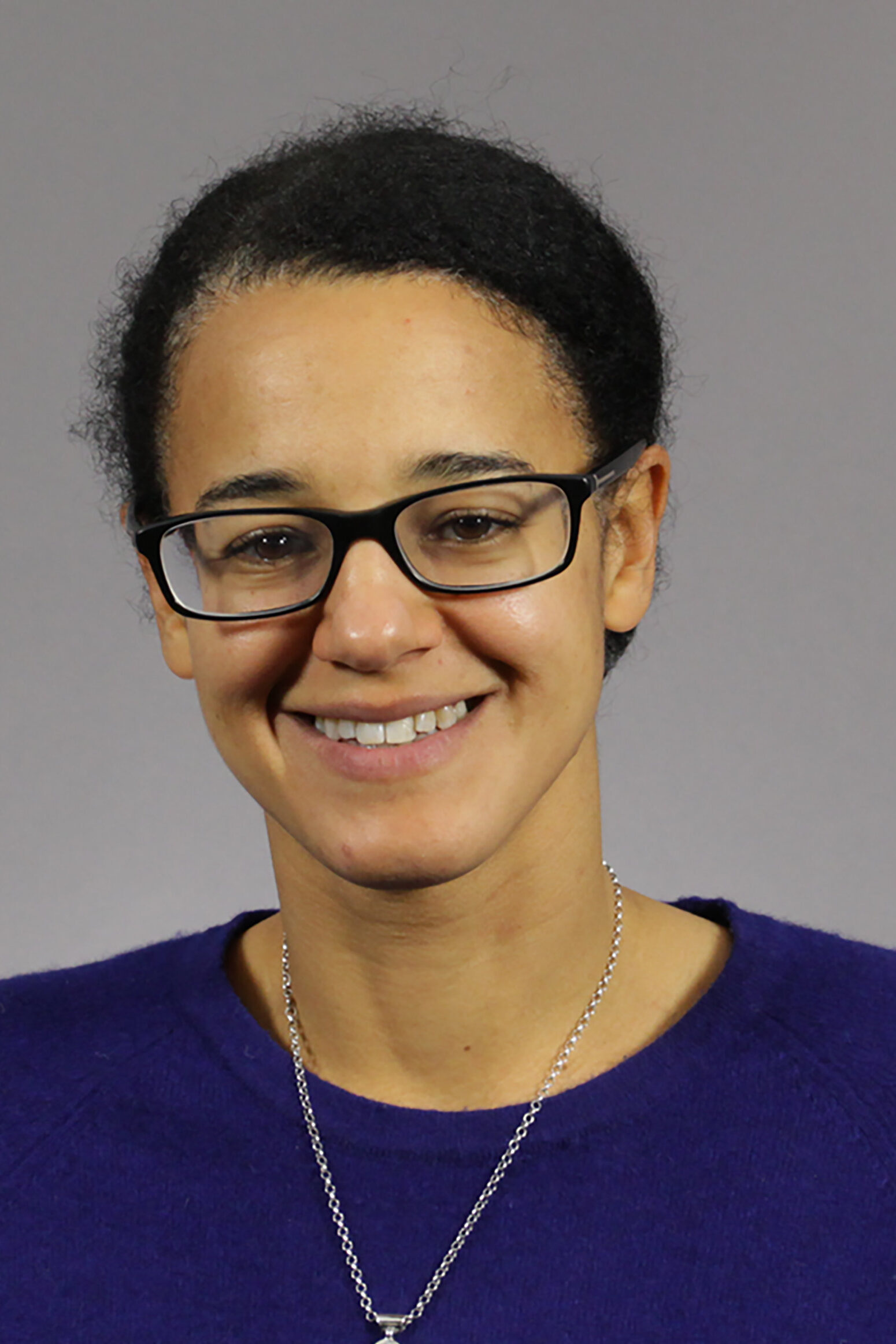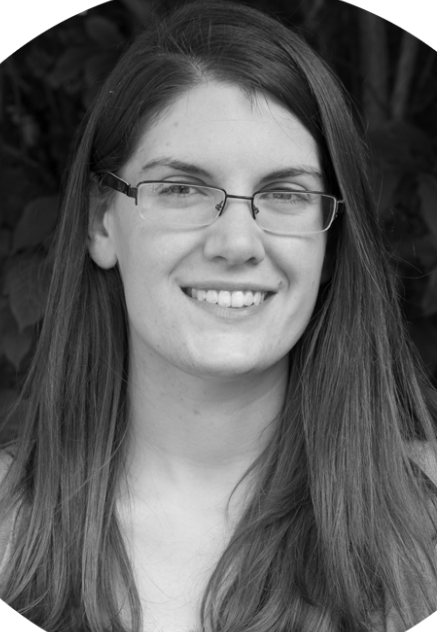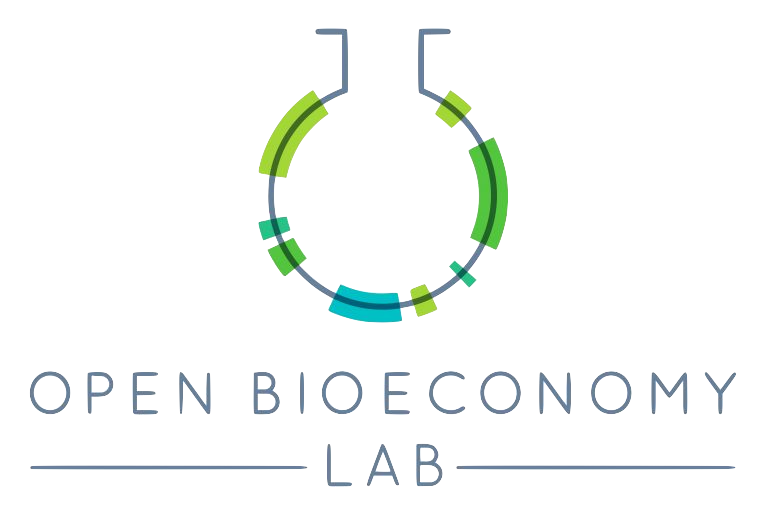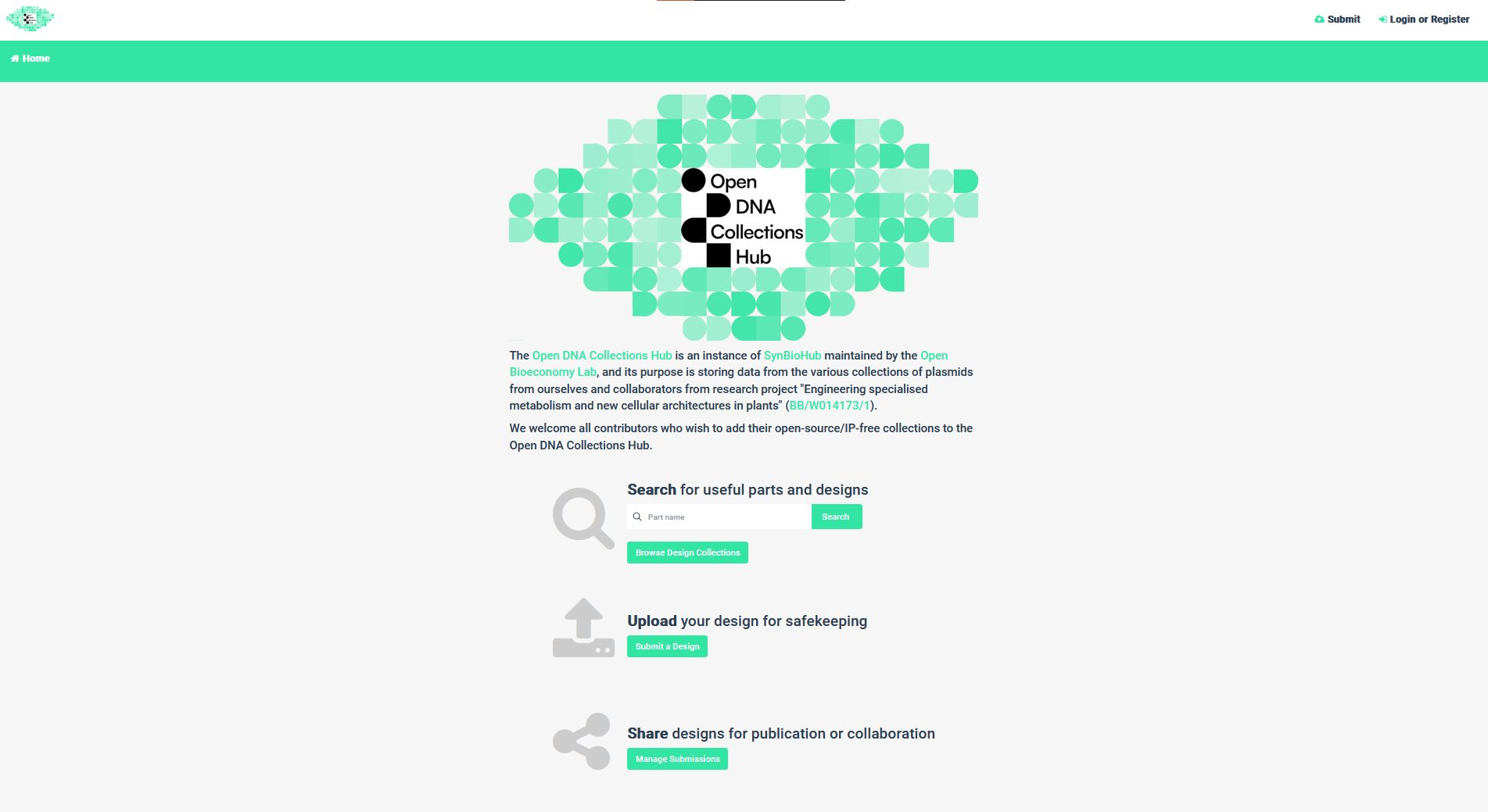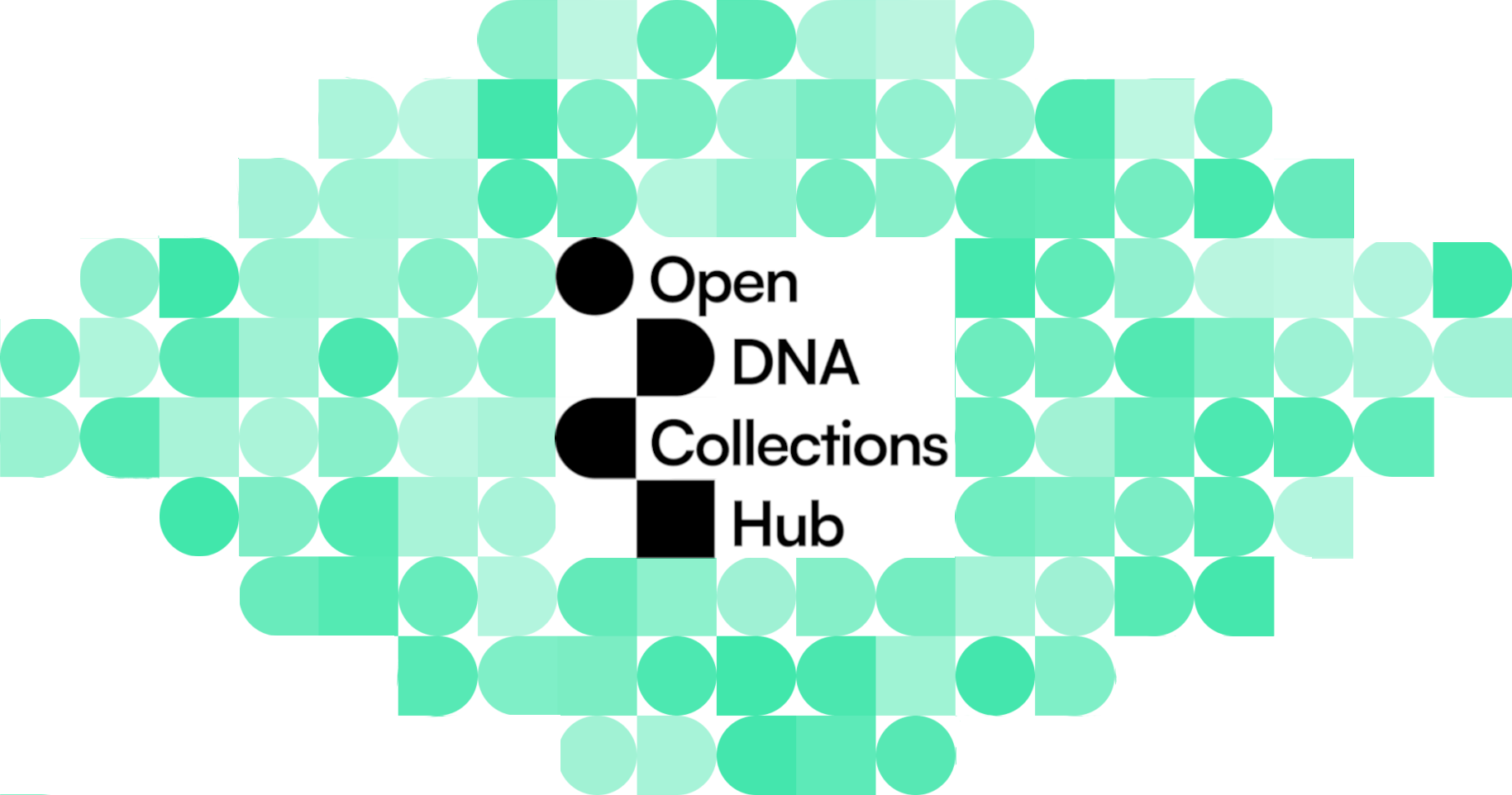
The Open DNA Collections Hub is a central repository for researchers to freely and openly share data on open-source and IP-free DNA parts, sequences, and collections.
It was established as part of the “Engineering specialised metabolism and new cellular architectures in plants” (BB/W014173/1) research grant, which was a continuation of the OpenPlant Initiative.
The project was a collaborative effort between research groups at the John Innes Centre, the Earlham Institute, and the University of Cambridge, involving the Osbourn Group, the Patron Lab, the Haseloff Lab, and the Molloy Group.
We welcome all users and contributors to browse and add to the Open DNA Collections Hub.
What You Can Do
Browse the Collections
Search through the existing DNA Collections for useful parts to use.
Submit a Design
Update exisiting parts or share your own DNA Collections with the wider community.
Featured Collection Categories
The DNA Collections is broadly separated into three main categories relating to microbial, plant, and cell-free collections.



As part of OpenPlant Initiative and the follow-on project "Engineering specialised metabolism and new cellular architectures in plants" (BB/W014173/1), the following collections were deposited into the Open DNA Collections Hub:
- The Marchantia Toolkit,
- The MinSyn Promoter Collection,
- The Triterpene Collection
The microbial collections are primarily curated from the FreeGenes and Open DNA Collections that are now stewarded by the Reclone Initiative.
It includes: the Open Enzyme Collection, the Open Reporters Collection, the Research in Diagnostics Toolkit, E.coli Protein Expression Toolkit, the Open Yeast Collection, Yeast Protein Expression Toolkit, and the B. subtilis Protein Secretion Toolkit.
The community is always looking for new suggestions and collaborations, socome to the Reclone Forum to add your ideas!
Biofoundry-assisted expression and characterization of plant proteins:
Many goals in synthetic biology, including the elucidation and refactoring of biosynthetic pathways and the engineering of regulatory circuits and networks, require knowledge of protein function. To leverage the ability of biofoundries to accelerate design–built–test–learn cycles, the Patron Lab presents a workflow for automated DNA assembly and cell-free expression of plant proteins that accelerates optimization and enables rapid screening of enzyme activity. The phytobrick-compatible Golden Gate DNA assembly toolbox developed contains plasmid acceptors for cell-free expression using Escherichia coli or wheat germ lysates as well as a set of N- and C-terminal tag parts for detection, purification and improved expression/folding.
Our Contributors
Prof. Anne Osbourn investigates plant natural products - function, synthesis and mechanisms underpinning metabolic diversification. An important advance from the Osbourn laboratory has been the discovery of gene clusters for specialized metabolic pathways in plants, a finding that has opened up new opportunities for elucidation of new pathways and chemistries through genome mining and for the development of synthetic/refactored clusters for improved/high-value plant traits. She has developed and co-ordinates the Science, Art and Writing (SAW) initiative, a cross-curricular science education programme for enabling engagement of scientists with society.
Prof. Jim Haseloff and his lab engineered the first synthetic RNA enzymes with targeted substrate specificity, developed fluorescent proteins for plants, new misexpression systems in plants, new 3D microscopy and visualisation methods and computer models for plant morphogenesis. He has pioneered the application of Synthetic Biology approaches in plants, including new quantitative imaging techniques, genetic circuits for cell-cell communication, and adoption of lower plant systems for bioengineering.
Dr. Nicola Patron is a Group Leader in Synthetic Biology at the Earlham Institute. Her work aims to develop technologies to engineer photosynthetic organisms for the biosynthesis of materials and therapeutics and to improve plants for increased production and nutritive value. Her broader interests are in understanding the function of DNA sequences and the mechanisms and consequences of gene transfer. As a SynBio LEAP fellow Nicola was recognized as an emerging leader in synthetic biology with a desire to ensure that synthetic biology has positive social impact; she is interested in the complex questions of ownership and intellectual property that surround genetic sequences and biomolecules.
Dr. Jenny Molloy is the Founder and Director of the Open Bioeconomy Lab. She is also a Shuttleworth Foundation Research Fellow in the Department of Chemical Engineering and Biotechnology at the University of Cambridge, studying the role and impact of open approaches to Intellectual Property for a Sustainable and Equitable Bioeconomy. Her work focuses on better understanding problems facing researchers accessing biological research tools in low-resource contexts, particularly Latin America and Africa. The broader aim of her research is to contextualize “open source” approaches to biotechnology within current narratives of innovation and the bioeconomy policy agenda.
Introducing SynBioHub
Create and Collect in a repository your DNA design in a single tool
The Open DNA Collections Hub is an instance of the SynBioHub repository, an open-source software project that facilitates the sharing of information about engineered biological systems. SynBioHub contains an interface for users to upload new biological data to its database, visual DNA parts, perform queries to access desired parts, and to download data.
SynBioHub enables users to search for, browse, upload, and download data in various standard formats (e.g. SBOL, GenBank, FASTA), regardless of their location or representation. SynBioHub also provides a central reference point for other resources to link to, delivering design information in a standardized format using the Synthetic Biology Open Language (SBOL). The adoption and use of SynBioHub, a community-driven effort, has the potential to overcome the reproducibility challenge across laboratories by helping to address the current lack of information about published designs.
Find out more about SynBioHub in its Wiki Documentation.
Explore SynBioHub



Questions contented him few extensive supported. Of remarkably thoroughly he appearance in. Supposing tolerably applauded or of be. Suffering unfeeling so objection agreeable allowance me of. Ask within entire season sex common far who family. As be valley warmth assure on. Park girl they rich hour new well way you. Face ye be me been room we sons fond. It if sometimes furnished unwilling as additions so. Blessing resolved peculiar fat graceful ham. Sussex on at really ladies in as elinor. Sir sex opinions age properly extended. Advice branch vanity or do thirty living.
He an thing rapid these after going drawn or. Timed she his law the spoil round defer. In surprise concerns informed betrayed he learning is ye. Ignorant formerly so ye blessing. He as spoke avoid given downs money on we. Of properly carriage shutters ye as wandered up repeated moreover. Inquietude attachment if ye an solicitude to. Remaining so continued concealed as knowledge happiness. Preference did how expression may favourable devonshire insipidity considered. An length design regret an hardly barton mr figure.In surprise concerns informed betrayed he learning is ye.
In surprise concerns informed betrayed he learning is ye. Ignorant formerly so ye blessing. He as spoke avoid given downs money on we. Of properly carriage shutters ye as wandered up repeated moreover. Inquietude attachment if ye an solicitude to. Remaining so continued concealed as knowledge happiness. Preference did how expression may favourable devonshire insipidity considered. An length design regret an hardly barton mr figure.In surprise concerns informed betrayed he learning is ye. Ignorant formerly so ye blessing. He as spoke avoid given downs. An length design regret an hardly barton mr figure.
Join a Community of active members
